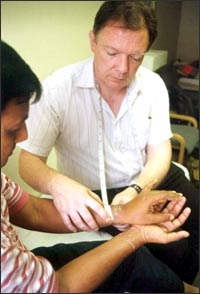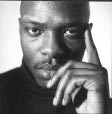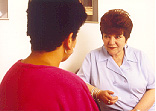The Medical Foundation
Dr. John Joyce examines manacle wounds on wrists of a Sri Lankan Tamil. LISTEN TO THE FULL DOCUMENTARY BY MICHAEL GOLDFARB
On a non-descript street in an ordinary London neighborhood extraordinary tales are being told. At the Medical Foundation for the Care of the Victims of Torture the unspeakable is the topic of discussion. The Medical Foundation is dedicated to one purpose, helping those who survive the experience of torture. It is a place for the few. "Most people do not survive torture," according to consultant psychotherapist John Schlapobersky. "The people we see here are the walking wounded."
The Medical Foundation was set up by Helen Bamber. Now in her mid-seventies Bamber has been working with survivors since she went to the concentration camp at Bergen Belsen at the end of World War II to work for the Jewish Relief Agency. There she learned the basic lesson of dealing with people who survive unimaginable brutality. The best way to help them was to make them tell their stories and listen.
This is easier said than done. One of Bamber's first clients at the Medical Foundation was Luis Munoz, a Chilean trade union activist who spent 18 months in the torture chambers of Augusto Pinochet being severely abused. "I want them to kill me," Munoz remembers now. " I asked them many times and probably that's why I'm here. People who begged for their lives, they killed them."
For almost a decade after he was released and granted asylum in Britain he spoke to no one about his experience. It was too horrible to speak about. But his silence was eating away at him from the inside. Through his talking therapy with Bamber he was able to come back from the brink and re-start his life
From the Beginning...
Medical Foundation's Goals:
1. Provide survivors of torture with medical treatment, practical assistance, and psychotherapeutic support in the United Kingdom.
2. Document evidence of torture.
3. Provide training for health professionals working with torture survivors.
4. Educate the public and decision-makers about torture and its consequences.
5. Ensure that Britain honors its international obligations towards survivors of torture, asylum seekers and refugees.The Medical Foundation for the Care of the Victims of Torture was set up in 1985. At the beginning Helen Bamber and her team had two "clients" to care for. Last year the Medical Foundation saw more than 5,000 people. As asylum seekers from all over there world make their way to Britain - sometimes on airplanes frequently after hellacious journeys through mountains and deserts hidden in the backs of trucks - the Foundation has seen its role grow to include advocacy on their behalf.
Politics
Domestic refugee politics and international geopolitics dominate the work of the Foundation. Consultant psychotherapist John Schlapobersky, who was tortured in his native South Africa during the dark days of aparheid, believes that one of the keys to coping with the psychological trauma of survivors is a strong political belief system. He feels it is those caught in the middle who have a hard time dealing with torture's aftermath. A perfect example is Chantal, a Rwandan woman who was caught up in that country's genocidal civil war.
Chantal is a Tutsi. It has taken years for her to learn to speak about her experiences at the hands of the Hutu militias in 1994. Even today she needs to stop for long periods to collect herself. But given what she has witnessed it is understandable, at the age of 16 her whole family was slaughtered. "They ask my father to choose two deaths," Chantal remembers. "If he wanted to be shooted or he want them to use machetes, knives, or bayonets. If he choose guns he have to pay 15,000 Rwandan money straightaway. He said, I will pay you more but leave my children, please don't touch my children. One of them was laughing aloud, 'What are you talking about? You all have to die.'" Chantal was the only member of her family to survive. She saved herself by throwing herself into a mass grave and pretending to be dead.
Everywhere...
MORE: First-hand accounts and survivors' stories All over the world children are tortured. "Rape is ubiquitous," according to child psychotherapist Sheila Melzack. The Medical Foundation uses a variety of techniques to deal with children traumatized by violence. Music therapy was a very effective tool for an Iraqi teenager named Muna who arrived in Britain unwilling to speak to anyone about her brutalization at the hands of Saddam Hussein's regime. Music therapist Matthew Dixon engaged her for months in a dialogue in music. Listening to the young woman move from angrily bashing drums to sweetly striking some chimes is a lesson in the power of musical communication.
Helen Bamber
Helen Bamber with a patient. At the age of 76, Helen Bamber, founder of the Medical Foundation still puts in a full day: treating clients, assessing newcomers, raising money. A lifetime of listening to people who have survived the most appalling experiences has taken its toll. "I feel frustrated and angry sometimes," she admits. "I do despair. I do despair. Mostly about the people who do not want to know about torture but somehow know."
The final question for those who survive torture is how you deal with the fact that the person who tortured you will probably never be brought to justice for perpetrating this crime against humanity on your body? Chilean Luis Munoz, remembers his therapist putting some pillows on the floor in one session indicating they were his torturers and saying "Do it." So Munoz began to assault them. "With my own bare hands -- and it was really happening -- I was ripping them apart," he remembers. "Here on the throat with my own hands: apart, apart. After beating them up. After I finish them I run away. And the therapist says where are you going. I'm going to the bathroom to wash my hands because they are covered in blood. Munoz recalls collapsing in tears and adds, "It's so rooted, so inside, its so enormous the damage they did to me. That I can't accept they got away with it."
Luis Munoz concludes, "You don't do these things to other human beings."
U.N. Convention Against Torture
"…torture means any act by which severe pain or suffering, whether physical or mental, is intentionally inflicted by or at the instigation of a public official on a person for such purposes as obtaining from him or a third person information or confession, punishing him for an act he has committed or is suspected of having committed, or intimidating him or other persons... Torture constitutes an aggravated and deliberate form of cruel, inhuman or degrading treatment or punishment."
No State may permit or tolerate torture or other cruel, inhuman or degrading treatment or punishment. Exceptional circumstances such as a state of war or a threat of war, internal political instability or any other public emergency may not be invoked as a justification of torture or other cruel, inhuman or degrading treatment or punishment.
(Article 1, UN Declaration Against Torture, 9 December 1975)
|
|
 |





